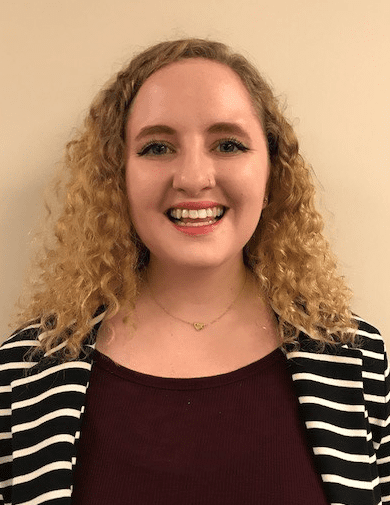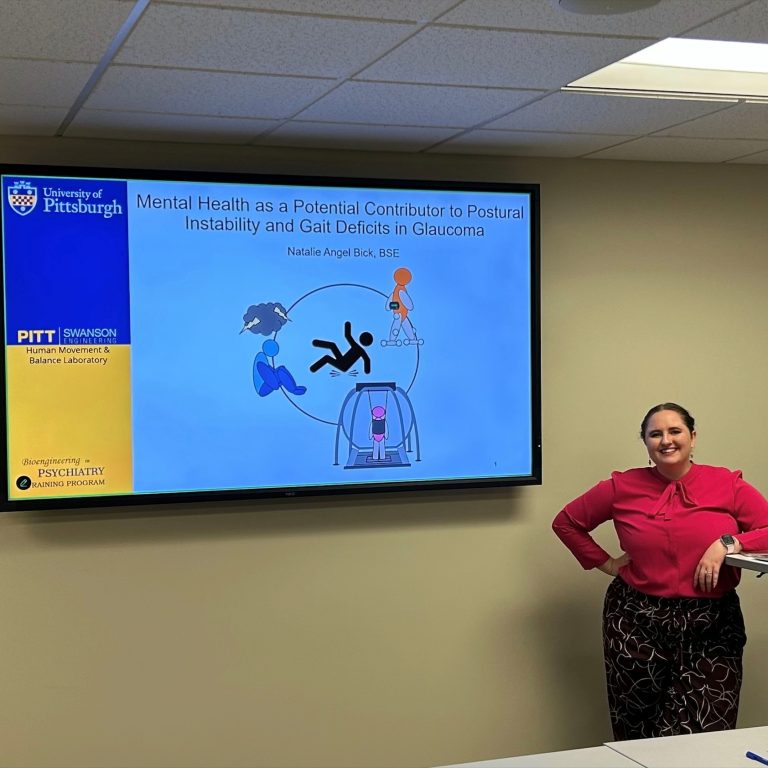
Graduate Student
Year Graduated: 2025
Natalie Bick
PhD Candidate
PhD Candidate
After HMBL
Pursuing Employment

Natalie Bick successfully defended her dissertation entitled “Mental Health as a Potential Contributor to Postural Instability and Gait Deficits in Glaucoma”!
Committee Chair was Rakié Cham and Committee Members included Helmet Karim, Howard Aizenstein, Mark Redfern, Subashan Perera, and Ian Conner.
See below for an abstract of her work.
Glaucoma is one of the leading causes of vision impairment globally. People with glaucoma fall at a greater rate than older adults without glaucoma, and falls can have adverse physical and psychological outcomes in older adults. Understanding the mechanisms of falls in people with glaucoma can inform treatment plans to prevent falls in this population. Specifically, impaired balance control, gait deficits, and depressive symptoms have been previously observed in people with glaucoma and are known contributors to fall risk in older adults. The goal of this thesis was to understand how balance/gait performance during happy and sad moods differs between people with and without glaucoma, and if mood impacts the relationship between poorer balance/gait and vision loss. To achieve these goals, participants completed health questionnaires and balance and gait testing with different somatosensory and visual inputs. During balance/gait testing, participants were asked to recall specific memories from throughout their lives that induced happy, sad, and neutral feelings to elucidate the impact of mood on balance and gait performance, with the expectation that people with glaucoma would display worse performance during sad moods. People with and without glaucoma did exhibit different mood-balance and mood-gait responses, though different trends were found during different sensory conditions. Within the group of participants with glaucoma, vision loss and balance/gait performance were often related, though the impact of mood on this relationship was varied. Vision loss and reduced gait smoothness were related during all moods and sensory conditions, and this relationship was stronger when depressive symptoms were controlled for, indicating that future work should use gait smoothness to evaluate gait deficits in this population. This thesis demonstrates that mood alters gait and balance performance in people with glaucoma. Understanding the scope of this relationship may be essential to preventing falls in this population. Methodological tools such as the Bertec CDP, frequency-derived measures of gait smoothness, and induced transient moods were effective in capturing glaucoma-specific balance/gait deficits. These paradigms can open doors for future interdisciplinary biomechanics and neural studies in people with glaucoma as well as in other populations.
People

Graduate Student
Year Graduated: 2025
Natalie Bick
PhD Candidate
PhD Candidate
After HMBL
Pursuing Employment



Affiliate
Charles F. Reynolds III and Ellen G. Detlefsen Endowed Chair in Geriatric Psychiatry and Professor of Bioengineering and Clinical and Translational Science



Research